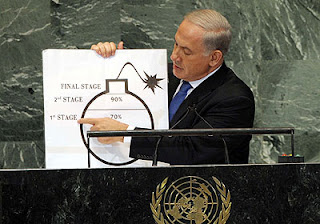Hours after the five Permanent Members of the United Nations Security Council (the "P-5") announced an interim deal that pulls Iran back from the threshold of nuclear weapons capacity, Israeli Prime Minister Benjamin Netanyahu has done more than denounce the agreement. By reasserting Israel's right to attack Iran at its own discretion, even following this international accord, Netanyahu has effectively set Israel as the Middle East's new rogue state - even without actually attacking Iran.
With Iran formally committed to the agreement, Israel is now the nation standing defiantly against world opinion and the international community. None of those countries party to the agreement - including France and the United States - can now abide an Israeli attack.
Israel is routinely criticized and condemned, with or without justification, for all manner of violations of international law. Yet it enjoys positive relations with dozens of countries and is seamlessly integrated into the global economy, and it has never directly defied the Security Council. Though the Council as an entity has not formalized the agreement, the P-5 and the European Union are all officially signed on. Agree or disagree (as I did elsewhere) with Netanyahu's assessment of the negotiations and the deal, he is now declaring Israel to be above the Security Council.


